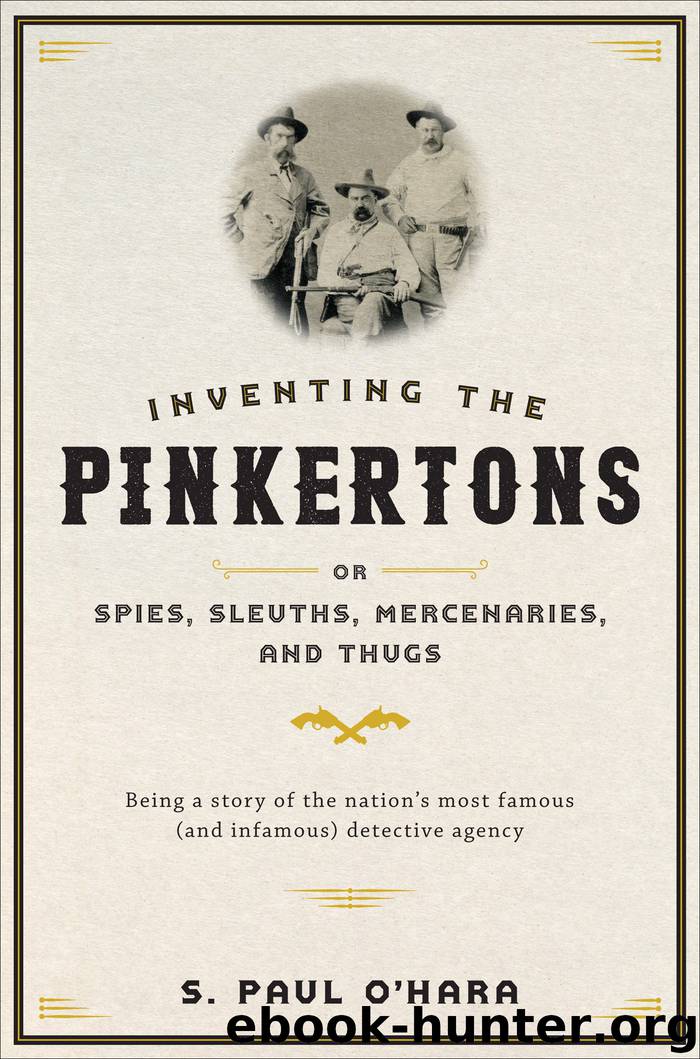Inventing the Pinkertons; or, Spies, Sleuths, Mercenaries, and Thugs by S. Paul O'Hara

Author:S. Paul O'Hara
Language: eng
Format: epub
Publisher: Johns Hopkins University Press
Published: 2016-03-14T16:00:00+00:00
The Pinkerton system is a standing menace to order and good government in this country
It was within this political climate that the US Congress took up the issue of the employment of Pinkertons. While both the House of Representatives and the Senate chose to investigate the role of private armies and guards, they asked very different questions. The Judiciary Committee of the House was mainly concerned with the legal ramifications of armed guards. The Pinkerton agency was a private firm hired to protect private property, yet local sheriffs would often deputize the agents, making them officers of the county. For the committee this was the primary concern of their investigation—were the guards deputized, when were they deputized, by whom, and should such guards ever be deputized?16 The Senate Committee on Labor and Education worried about the effect of Pinkerton agents on labor strife. It wanted to know what conditions precipitated the hiring of Pinkerton agents and “what legislation if any is necessary to prevent further unlawful use of employment of such armed bodies of men for private purposes.” In his testimony before the committee, Powderly was far more direct in his critique. “The Pinkerton system,” he declared, “is a standing menace to order and good government in this country.”17
The testimony before the Senate committee largely consisted of three different groups: law enforcement officials weighed in on the use of armed militias and the ethnic makeup of working classes, capitalists explained their need for Pinkerton agents, and workers described their relationship with Pinkerton guards and the foreign populations within their industries. Among law enforcement officials, there was great disagreement about the legitimacy of the Pinkertons. Robert W. McClaughry, general superintendent of police in Chicago, testified that Pinkertons serve “as an irritant rather than having a quieting effect.” Public order should be established by the police, he felt, and if they were incapable, then the state militia should be called in. But the Pinkerton Patrol was “an utterly vicious system” that was “responsible for much of the ill-feeling and bad blood displayed by the working classes.” Captain Patrick Foley of the Pinkerton Protective Patrol disagreed vehemently. In cases of industrial unrest, he argued, Pinkertons acted “as special police and deputy sheriffs” and as such have often been called upon to confront “hoodlums and toughs.” A willingness to use force to reestablish order made the Pinkertons effective because unruly crowds feared “the increased power” of the Pinkerton men. “I will state without fear of contradiction,” Foley declared, “that class of people have no respect for the law or law officers. . . . The only law they recognize is the law of might.” The Pinkerton guards played an important role in preserving order largely because the state was unwilling or unable to do so. “Now Captain from your long experience in this sort of work,” the committee asked Foley, “what reason can you give, that is satisfactory to yourself, why your sort of men here in Chicago should be employed to preserve the
Download
This site does not store any files on its server. We only index and link to content provided by other sites. Please contact the content providers to delete copyright contents if any and email us, we'll remove relevant links or contents immediately.
International Integration of the Brazilian Economy by Elias C. Grivoyannis(109585)
The Radium Girls by Kate Moore(12014)
Turbulence by E. J. Noyes(8040)
Nudge - Improving Decisions about Health, Wealth, and Happiness by Thaler Sunstein(7689)
The Black Swan by Nassim Nicholas Taleb(7105)
Rich Dad Poor Dad by Robert T. Kiyosaki(6603)
Pioneering Portfolio Management by David F. Swensen(6288)
Man-made Catastrophes and Risk Information Concealment by Dmitry Chernov & Didier Sornette(6002)
Zero to One by Peter Thiel(5786)
Secrecy World by Jake Bernstein(4740)
Millionaire: The Philanderer, Gambler, and Duelist Who Invented Modern Finance by Janet Gleeson(4464)
The Age of Surveillance Capitalism by Shoshana Zuboff(4274)
Skin in the Game by Nassim Nicholas Taleb(4235)
The Money Culture by Michael Lewis(4196)
Bullshit Jobs by David Graeber(4179)
Skin in the Game: Hidden Asymmetries in Daily Life by Nassim Nicholas Taleb(3987)
The Dhandho Investor by Mohnish Pabrai(3758)
The Wisdom of Finance by Mihir Desai(3727)
Blockchain Basics by Daniel Drescher(3574)
